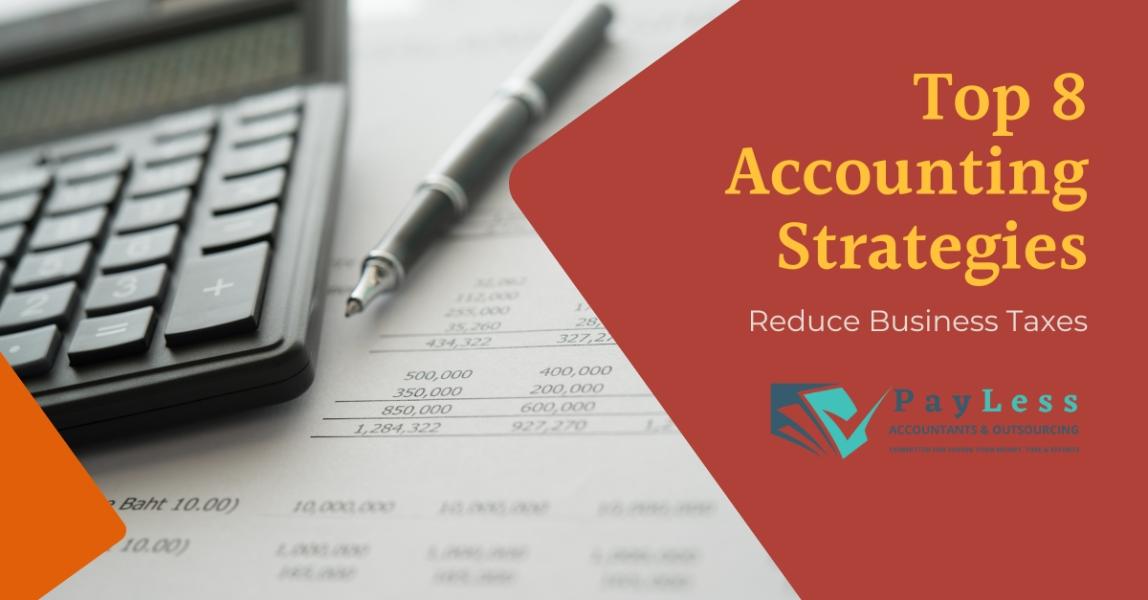Top 8 Accounting Strategies to Reduce Business Taxes in 2025
At Payless Accountant, we understand that every rupee counts. That’s why we’ve compiled the top 8 accounting strategies to help businesses minimize their tax liabilities in 2025.
1. Optimize Your Business Structure
Choosing the right business structure—whether a sole proprietorship, partnership, or private limited company—can significantly impact your tax obligations. Corporations often benefit from lower tax rates on profits and access to various deductions unavailable to other structures. Reassessing your business setup annually ensures you’re leveraging the most tax-efficient structure.
2. Maximize Deductions and Credits
Many businesses miss out on deductions they are eligible for. Expenses such as office rent, utilities, software subscriptions, business travel, and employee benefits can reduce your taxable income. Additionally, tax credits for research and development, green initiatives, or training programs can further decrease your liability. Keep meticulous records to ensure you claim every eligible deduction.
3. Leverage Depreciation Strategies
Depreciation allows businesses to deduct the cost of tangible assets like machinery, vehicles, or computers over their useful life. Accelerated depreciation methods, such as the double-declining balance, can front-load deductions, reducing taxes in the initial years of asset usage. Speak with a professional accountant to determine the optimal depreciation approach for your business.
4. Contribute to Retirement Plans
Contributions to employee retirement plans, including EPF and NPS, are typically tax-deductible. Not only does this reduce your taxable income, but it also strengthens employee retention and morale. For business owners, maximizing contributions to personal retirement plans can also result in significant tax savings.
5. Manage Inventory Smartly
For businesses dealing with physical products, inventory management plays a crucial role in tax planning. Choosing the right method—FIFO (First In, First Out) or LIFO (Last In, First Out)—can influence your cost of goods sold and taxable income. Regularly reviewing inventory valuations helps in minimizing tax liabilities effectively.
6. Utilize Loss Carryforwards
If your business experiences a loss in a financial year, these losses can often be carried forward to offset future profits. This strategy can reduce taxes in profitable years, smoothing out your tax obligations over time. Accurate bookkeeping ensures that you can take full advantage of this opportunity.
7. Consider Tax-Efficient Financing
Interest paid on business loans or credit can often be deducted from taxable income. Strategic financing decisions, such as leveraging debt for expansion or investing in growth initiatives, can provide tax benefits while supporting business development. Ensure you track all interest expenses accurately for maximum deductions.
8. Engage a Professional Accountant
The tax landscape is constantly evolving, with new regulations and exemptions introduced every year. Partnering with an experienced accountant, like Payless Accountant, ensures that your business stays compliant while optimizing tax savings. Professionals can provide tailored advice, identify overlooked deductions, and help implement long-term tax strategies.
Disclaimer: The information provided in this blog is for general informational purposes only and does not constitute professional tax, legal, or financial advice. While we strive to provide accurate and up-to-date information, tax laws and regulations are subject to change and may vary based on your location and specific business circumstances. For personalized advice tailored to your business, please consult a qualified accountant or tax professional.

